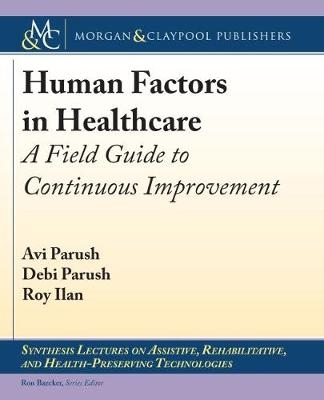
Human Factors in Healthcare
Morgan and Claypool Life Sciences (Verlag)
978-1-62705-944-2 (ISBN)
- Lieferbar
- Versandkostenfrei
- Auch auf Rechnung
- Artikel merken
Have you ever experienced the burden of an adverse event or a near-miss in healthcare and wished there was a way to mitigate it? This book walks you through a classic adverse event as a case study and shows you how.
It is a practical guide to continuously improving your healthcare environment, processes, tools, and ultimate outcomes, through the discipline of human factors. Using this book, you as a healthcare professional can improve patient safety and quality of care.
Adverse events are a major concern in healthcare today. As the complexity of healthcare increases-with technological advances and information overload-the field of human factors offers practical approaches to understand the situation, mitigate risk, and improve outcomes.
The first part of this book presents a human factors conceptual framework, and the second part offers a systematic, pragmatic approach. Both the framework and the approach are employed to analyze and understand healthcare situations, both proactively-for constant improvement-and reactively-learning from adverse events.
This book guides healthcare professionals through the process of mapping the environmental and human factors; assessing them in relation to the tasks each person performs; recognizing how gaps in the fit between human capabilities and the demands of the task in the environment have a ripple effect that increases risk; and drawing conclusions about what types of changes facilitate improvement and mitigate risk, thereby contributing to improved healthcare outcomes.
Avi Parush is an associate professor at the Industrial Engineering and Management Faculty, The Israel Institute of Technology, and an emeritus professor from the psychology department of Carleton University, Ottawa, Canada. With over 30 years of practice and research in human factors, HCI, and usability, Avi devoted his career to influencing the design of workplaces and the tools people use to make their lives easier, safer, and more beneficial. His current research focuses on teamwork in complex and critical situations in healthcare, first-response and other domains, and simulation-based training with a focus on team training. He is the emeritus founding editor-in-chief of the Journal of Usability Studies, and is currently on the editorial board of the Human Factors Journal. Debi Parush analyzes and designs knowledge-sharing systems to fill gaps and constantly improve. Debi has practiced listening and questioning for insights, and synthesizing and designing training and other performance support solutions in Israeli and Canadian high tech industriesas well as in public service. Debi has a Master Degree's in Educational Technology-bridging the gap between where we are and where we need to be-and a Graduate Certificate in Conflict Resolution-getting there together sometimes requires facilitation. For many years, Debi has managed a consulting firm specializing in human factors, human-computer interaction design, developing training and marketing materials, and editorial services. Dr. Roy Ilan practices Internal Medicine and Critical Care Medicine, and provides supervision to students and residents at various training levels in both specialties at Kingston General Hospital, a tertiary care teaching center affiliated with Queen's University. He co-chairs the patient safety and quality improvement (PS&QI) committees for the Departments of Medicine and Critical Care Medicine. His research is focused on patient safety and quality improvement, and he has implemented system-level interventions to address various issues. Dr. Ilan has taught extensively in the area of PS&QI at different organizations, including the Canadian Patient Safety Institute (CPSI), the Royal College of Physicians and Surgeons of Canada, and Queen's University. Ron Baecker is Professor of Computer Science, Bell Universities Laboratories Chair in Human-Computer Interaction, and Director of the Technologies for Aging Gracefully lab (TAGlab) at the University of Toronto. He has been named one of the 60 Pioneers of Computer Graphics by ACM SIGGRAPH, has been elected to the CHI (Computers and Human Interaction) Academy by ACM SIGCHI, and has been given the Canadian Human Computer Communications Society Achievement Award. In previous lifetimes, he played a pivotal role in organizing, editing, and republishing key literature from two then newly burgeoning fields (Readings in Human Computer Interaction, 1st Ed., 1987, 2nd Ed., 1995 and Readings in Computer-supported Cooperative Work, 1993).
Background to Human Factors in Healthcare
Part I: A Conceptual Framework
About Human Factors Frameworks
HF-MARC: Using the Human Factors Conceptual Framework to Map-Assess-Recognize-Conclude
Part II: The Human Factors Field Guide
Overview: A Human Factors Approach to Continuous Improvement
Start the Process
Map the Context
Assess Fit
Interim Findings: Problems of Fit
Recognize Emergent Factors
Conclude: Performance and Outcomes
Interventions and Mitigations
This is Not the End
Appendix A: The Detailed Checklist
Appendix B: Fully Analyzed Sepsis Management Scenario
References and Resources
Author Biographies
| Erscheinungsdatum | 09.03.2017 |
|---|---|
| Reihe/Serie | Synthesis Lectures on Assistive, Rehabilitative, and Health-Preserving Technologies |
| Mitarbeit |
Herausgeber (Serie): Ron Baecker |
| Verlagsort | San Rafael, CA |
| Sprache | englisch |
| Maße | 191 x 235 mm |
| Gewicht | 525 g |
| Themenwelt | Informatik ► Software Entwicklung ► User Interfaces (HCI) |
| Medizin / Pharmazie ► Gesundheitswesen | |
| ISBN-10 | 1-62705-944-X / 162705944X |
| ISBN-13 | 978-1-62705-944-2 / 9781627059442 |
| Zustand | Neuware |
| Haben Sie eine Frage zum Produkt? |
aus dem Bereich


